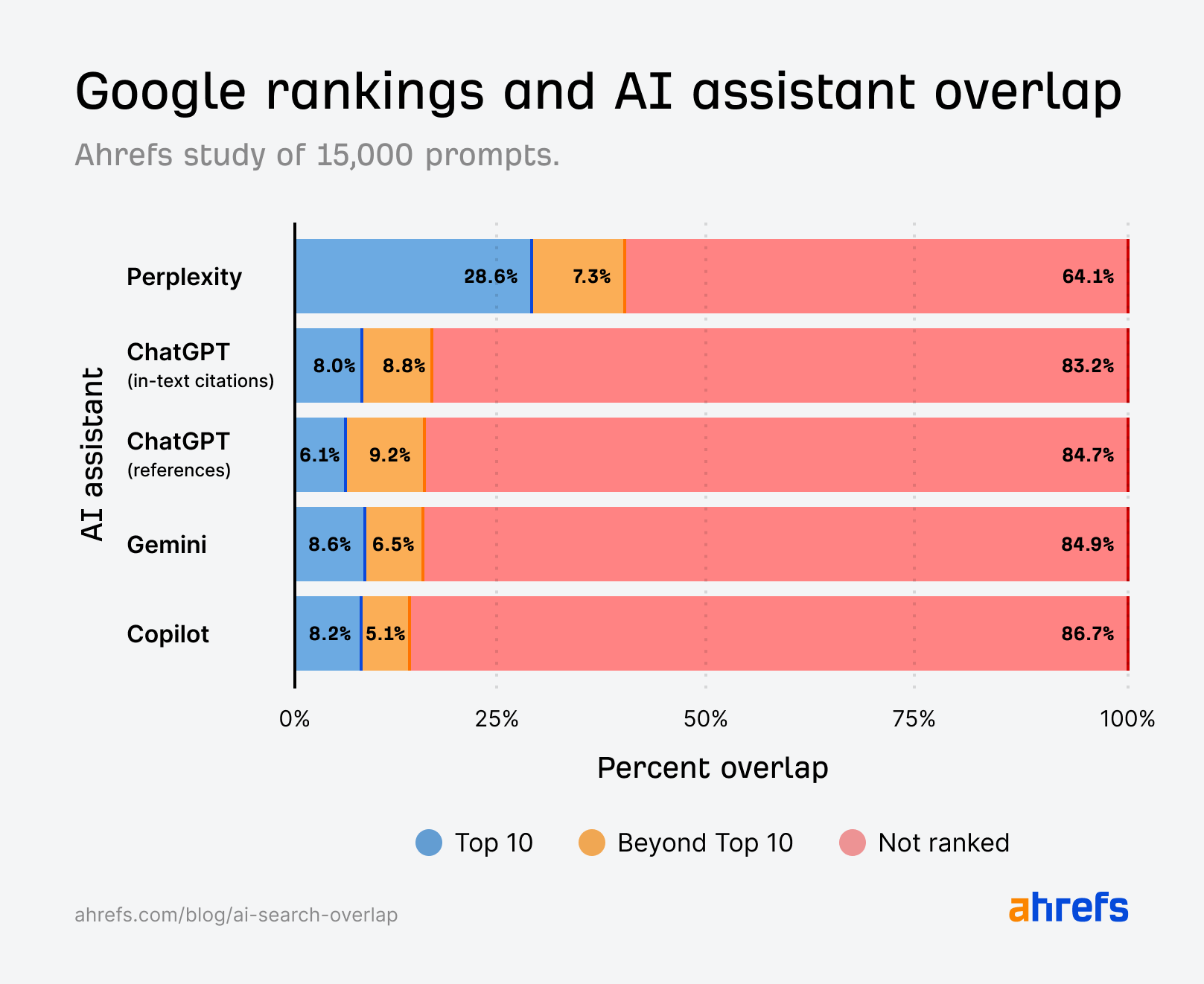If traffic from search goes up, so do their stock prices. But recently, many companies saw major traffic (and revenue) declines thanks to changes in AI search.
This post is for you if you’re a business stakeholder, journalist, researcher, or marketer looking for up-to-date data on how AI is changing search so you can stay ahead of the game.
It features 81 AI SEO statistics from our latest data studies and is updated monthly to keep it fresh.
Source)
Websites with more organic search traffic get mentioned more in AI search results. (Source)
80% of sources cited by AI search platforms don’t appear in Google; only 12% match Google’s top results. (Source)
AI search platforms prefer to cite content that is 25.7% fresher than content cited in traditional organic results. (Source)
86% of top-mentioned sources are not shared across ChatGPT, Perplexity, and Google AI features. (Source)
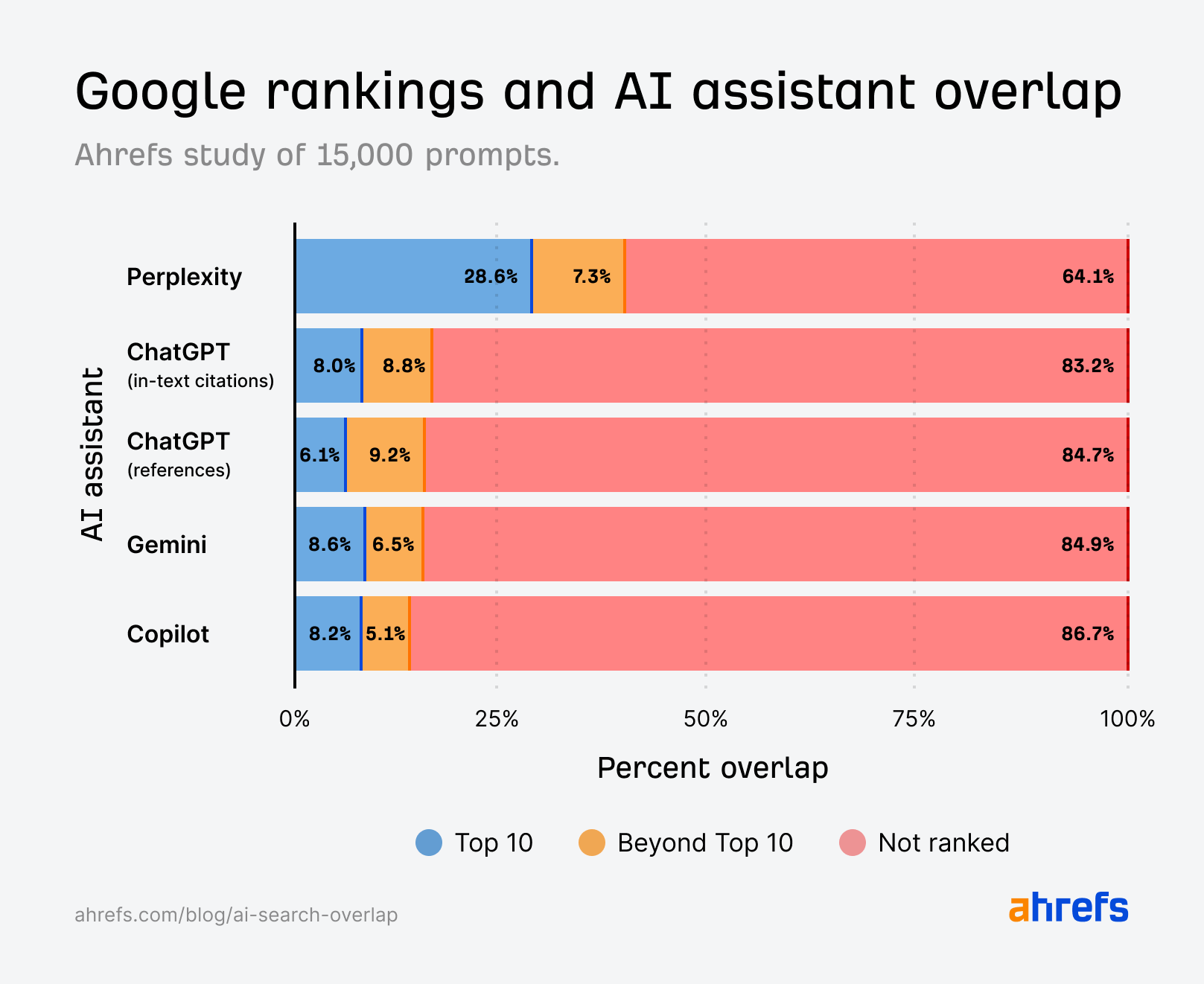
Google’s AI Overviews
AI Overviews are one of the most disruptive features Google has launched, altering click-through rates and visibility across industries.
The following numbers show their reach, growth, and the factors that influence which brands get cited.
- AI Overviews had over 1.5 billion users a month in Q1 2025. That would be 18.3% of all the people on the planet, or 26.6% of all internet users. (Source)
- AI Overviews reduce clicks to websites by 34.5%. (Source)
- 26% of brands have zero mentions in AI Overviews. (Source)
- The top 50 brands appearing in AI Overviews account for 28.9% of all citations. (Source)
- 8.64% of AI Overviews appear outside of position #1 and as low as position #6. (Source)
- Being mentioned on highly linked pages has a strong correlation with visibility in AI Overviews. (Source)
- AI Overviews lean more heavily on UGC sites, displaying Reddit 3.4%, Quora 2.2%, and YouTube 2% more than expected. (Source)
- 16% of US searches on Google feature AI Overviews. (Source)
- AI Overviews have grown by 116%, doubling since Google’s March Core Update. (Source)
- 76% of AI Overview citations are pulled from the pages, ranking in Google’s top 10 organic results. (Source)
- AI Overviews show more than normal for informational queries, longer search queries, and queries with higher search volumes. (Source)
- AI Overviews show up less than normal for branded queries, local queries, and shorter search queries. (Source)
- 71.67% of AI Overview search results aren’t monetized, displaying no CPC data. (Source)
- Rankings matter for visibility in AI Overviews, but there’s only a moderate correlation. (Source)
- Pages with a higher ranking in organic results tend to be cited higher in AI Overviews when included as a citation. (Source)
- Brands in the top 25% for web mentions earn over 10× more AI Overview mentions than the next quartile. (Source)
- Reddit now appears in 5.5% of AI Overviews. (Source)
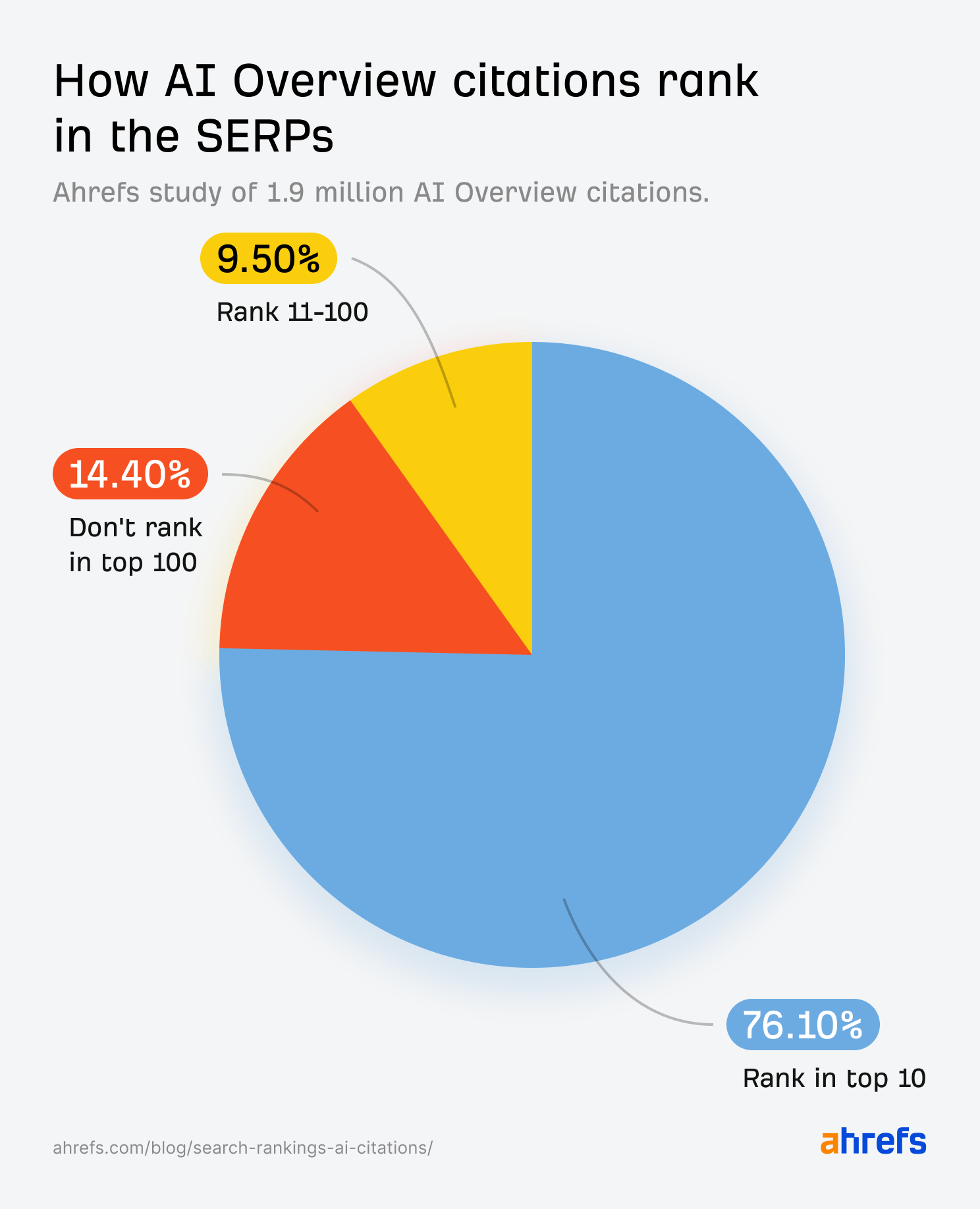
ChatGPT
As the most widely used AI assistant, ChatGPT has become the single biggest driver of AI referral traffic.
These stats highlight how it sources information, what types of content it favors, and its outsized role in shaping AI search behavior.
- ChatGPT sends about 5% more traffic than Reddit. (Source)
- Google does not power most ChatGPT results. Only 6.82% of ChatGPT results overlap with Google’s top 10; 83% of its answers cite URLs not in Google at all. (Source)
- ChatGPT has driven AI traffic growth to websites almost single-handedly, growing 85% since January. (Source)
- ChatGPT is the top AI referrer, accounting for over 80% of AI traffic to websites. That’s up 30% since our previous study. (Source)
- Being mentioned on highly linked pages has a weak correlation with visibility in ChatGPT responses. (Source)
- ChatGPT is the most likely platform to cite newer content. It orders in-text references from newest to oldest. (Source)
- News outlets like Reuters, Apple News, and AS.com feature prominently in ChatGPT (4 – 2.6%) but are secondary or absent in the others. ChatGPT likes news sites. (Source)
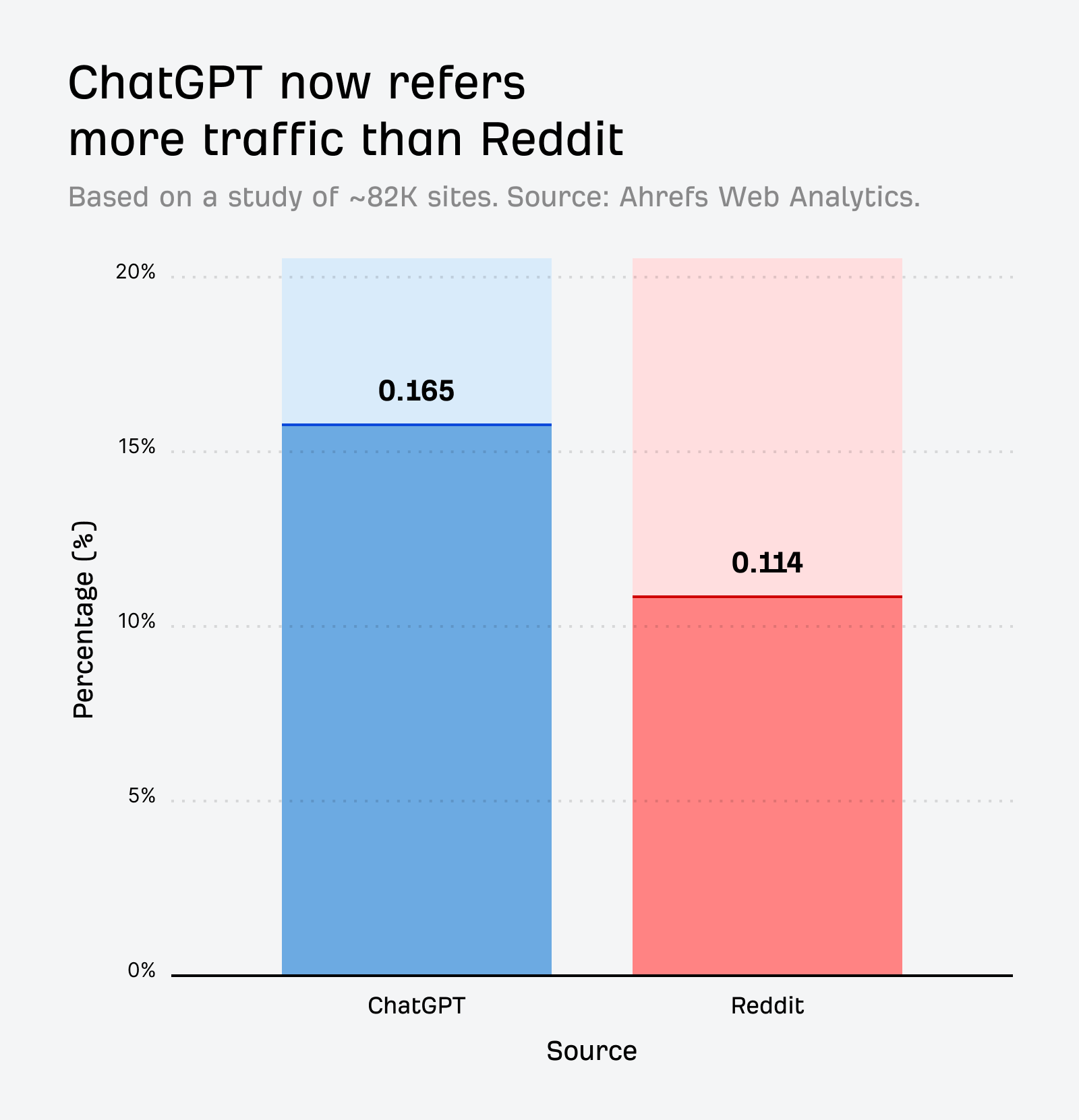
AI citation insights
Not all websites are treated equally in AI results. This section covers which platforms and content types get favored, and how citation patterns vary between ChatGPT, Perplexity, and Google’s AI Overviews.
- Wikipedia dominates all three AI assistants, but ChatGPT (16.3%) cites it most, then Perplexity (12.5%), then AI Overviews (8.4%). (Source)
- YouTube is a clear favorite in Perplexity (16.1%) and AI Overviews (9.5%), but is missing in the top in ChatGPT. (Source)
- Reddit and Quora rank high only in AI Overviews (7.4% & 3.6%). They don’t crack the top-10 in ChatGPT or Perplexity. It seems Google favors user-generated content sites. (Source)
- Health/medical sites (Mayo Clinic, Cleveland Clinic) register in AI Overviews but are not in the top 10 for ChatGPT or Perplexity. (Source)
- Reddit is 3.4% more likely to be mentioned in AI Overviews and Google results than expected. (Source)
AI bot behavior
AI bots are quickly catching up to traditional search crawlers. These stats show how fast they’re growing, which bots are most blocked, and what that means for publishers managing traffic and server load.
- The number of AI bots has doubled since August 2023, with 21 major AI bots now active on the web. (Source)
- GPTBot (OpenAI) is the most blocked AI bot, with 5.89% of all websites blocking them. (Source)
- ClaudeBot (Anthropic) saw the highest growth in block rates, increasing by 32.67% over the past year. (Source)
- AI bots are increasing their crawling activities, reaching 2nd place behind search engine bots and contributing to 25% of requests. (Source)
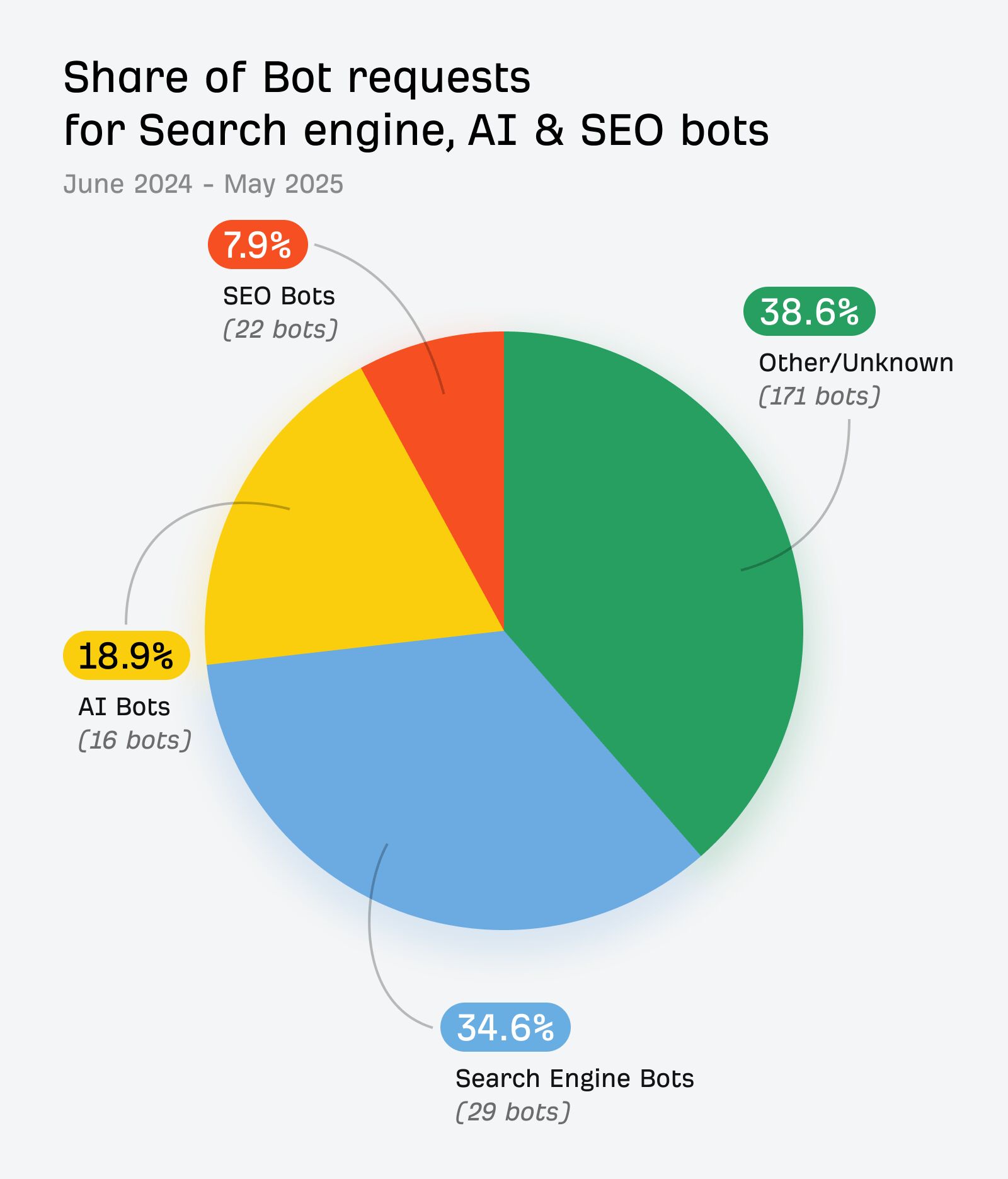
Source)
Only 26% of new web content is entirely human-created, and only half of that (13.5%) ranks in top positions on Google. (Source)
Best-of content, product pages, and guides drive the most AI traffic. (Source)
AI-generated content does not hurt your Google rankings. 86.5% of content in the top 20 is at least partially AI-generated. (Source)
However, purely AI content rarely reaches position #1 in organic Google results. (Source)
Human content was 4% more likely to be negatively impacted by a Google update than AI content. (Source)
91.4% of content cited in AI Overviews is at least partially AI-generated. (Source)
There is no correlation between the amount of AI content in an article and search ranking position. (Source)
There is no correlation between AI content percentage and the order of citations in AI Overviews. (Source)
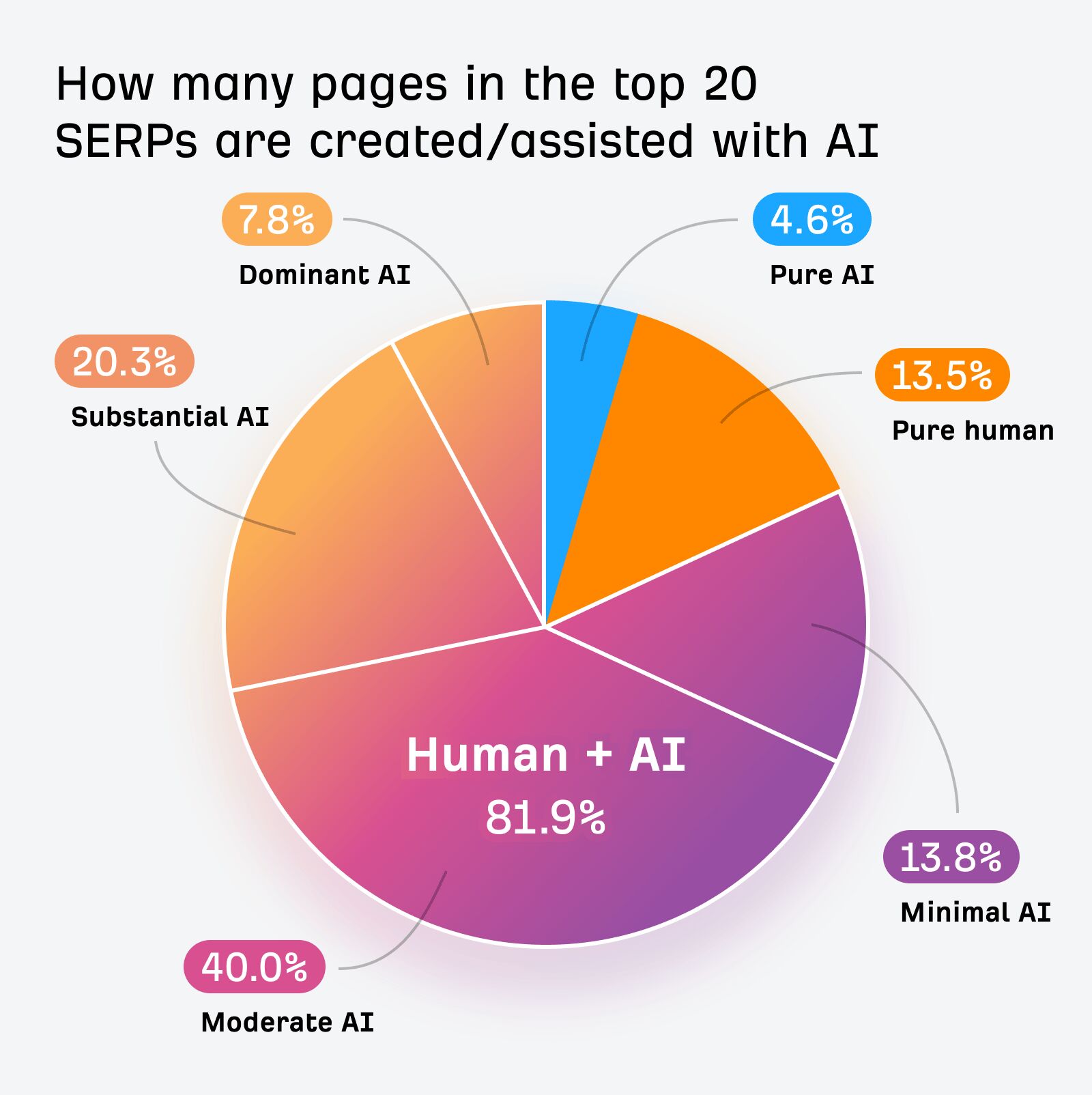
AI content adoption
Marketers are rapidly adopting AI to scale production.
This section outlines how widely AI is used, what tasks it supports, and the cost benefits driving businesses to increase investment in AI tools and content creation.
- 87% of marketers use AI to help create content. (Source)
- AI content is 4.7x cheaper than human-written content. (Source)
- The average cost per AI-generated blog post is $131, compared to $611 for human-written posts. (Source)
- Companies spend an average of $188 per month on AI tools for content creation and marketing. (Source)
- 51% of companies plan to increase their spend on AI-generated content. (Source)
- Websites using AI grow 5% faster than those that don’t. (Source)
- Marketers using AI publish 42% more content: the median monthly publishing frequency using AI was 17 articles, compared to 12 for those not using AI. (Source)
- 97% of companies have a review process for AI content and do not publish pure AI content. (Source)
- Blog posts are the most common type of AI-generated content (87%). Brainstorming (76%), outlining (73%), and content updates (67%) are the top AI-assisted SEO tasks. (Source)
- 84% of companies do not disclose the use of AI in their content. (Source)
- ChatGPT is the most common AI model for content creation, used by 44% of respondents, followed by Gemini (15%) and Claude (10%). In total, 94 distinct AI tools were referenced. (Source)
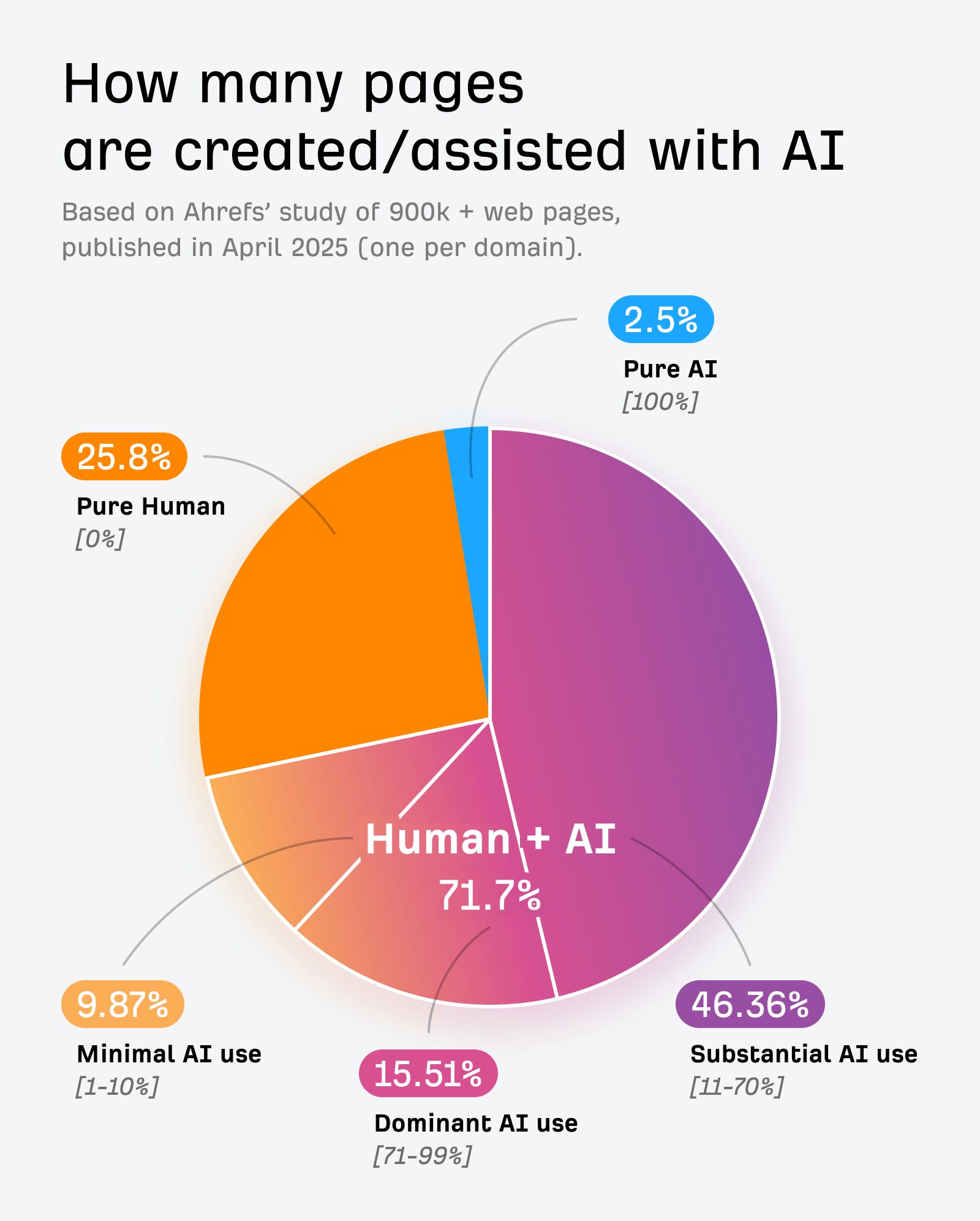
AI may still send a small share of traffic, but the quality of those visits can be disproportionately high.
These stats break down AI referral volume, user behavior, and why AI visitors often convert at higher rates than search users.
- AI makes up 0.1% of web referral traffic. (Source)
- Average web traffic from search has dropped 21% over the last year. (Source)
- AI traffic has increased 9.7x in the past year. (Source)
- Traffic from AI assistants generated 12% of signups to Ahrefs while accounting for only 0.5% of traffic. (Source)
- For Ahrefs, AI search visitors convert 23x better than traditional organic search visitors. (Source)
- Users from AI search click links 75% less than they do in traditional search. (Source)
- About 0.25% of a site’s total traffic comes from AI. (Source)
- ChatGPT sends out marginally more traffic than Reddit and LinkedIn. (Source)
- Perplexity has overtaken Gemini as a traffic referral source. (Source)
- Sites receiving under 10K visits can expect 0.3% of their traffic to come from LLMs, vs. 0.1% for those exceeding 1 million visits. (Source)
- Visitors from common AI platforms like ChatGPT and Perplexity visit 4 pages on average. That’s 1.2 fewer pages compared to search visitors, and 1.5 fewer pages than overall visitors (Source)
- AI visitors spend slightly longer on site (8 seconds more) than other visitors. Their sessions are longer in duration but shallower in depth as they’re 5.4% more likely to bounce. (Source)
- Websites with more traffic from organic search also get mentioned more in AI responses. (Source)
- 63% of websites receive AI traffic. (Source)
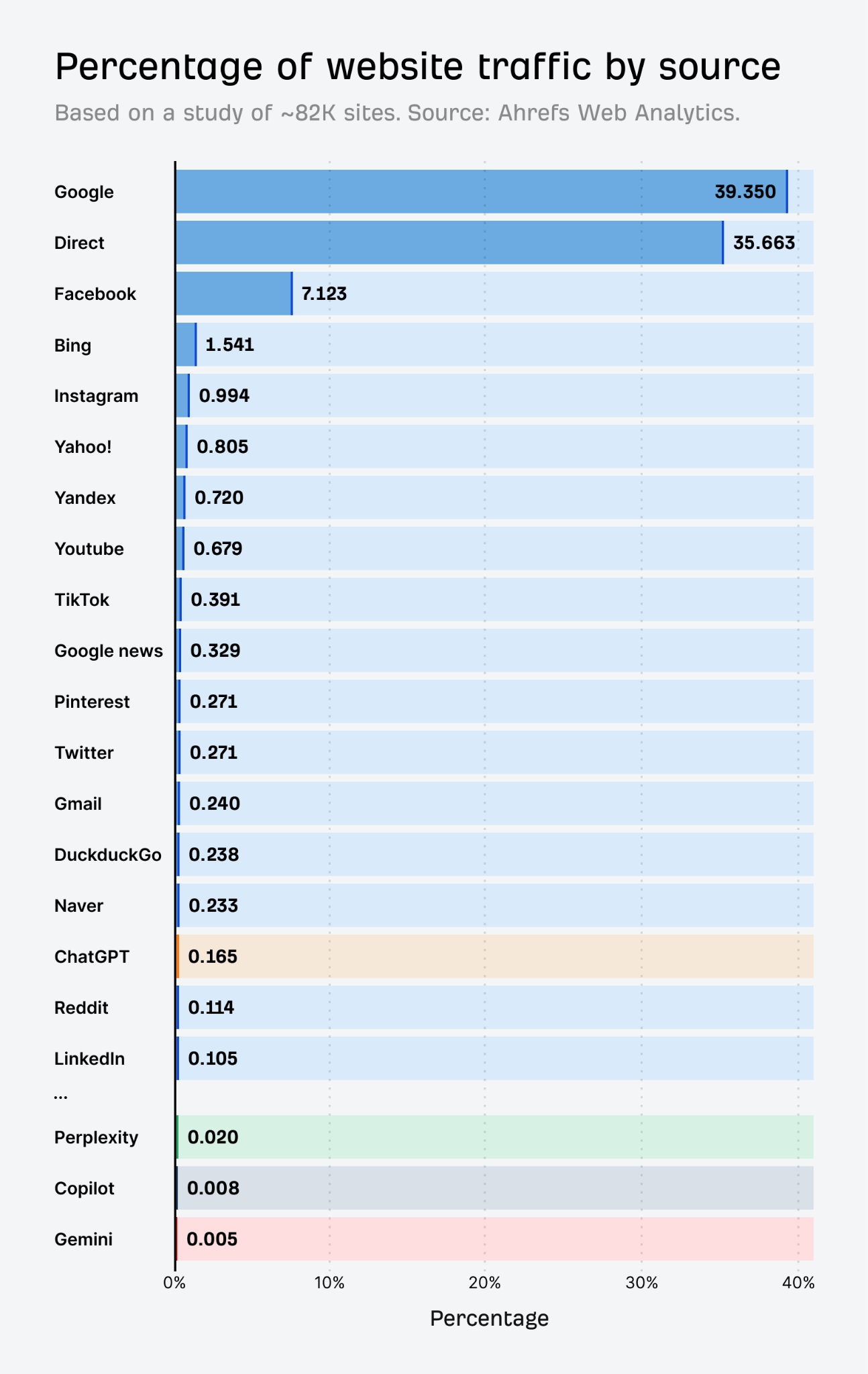
AI search rewards authority and recognition, often more than links or ads.
Here’s how branded web mentions, anchors, and search volume influence AI Overview visibility and why some brands dominate while others remain invisible.
- Brands in the top 25% for web mentions get 10x more AI visibility than others. (Source)
- The top 50 brands (ranked by online authority) receive 28.90% of all mentions in AI Overviews. (Source)
- Google seems more biased toward featuring big brands than ChatGPT and Perplexity. (Source)
- 45.7% of Google searches are branded. (Source)
- Strong online branding correlates positively with visibility in AI Overviews. Branded web mentions had the strongest correlation, followed by branded anchors and search volume. (Source)
- Backlinks have weaker correlations with visibility in AI Overviews compared to brand factors. (Source)
- Paid factors like branded ad traffic and branded ad cost show weak positive correlations with AI mentions. (Source)
- 26% of brands have zero mentions in AI Overviews. (Source)
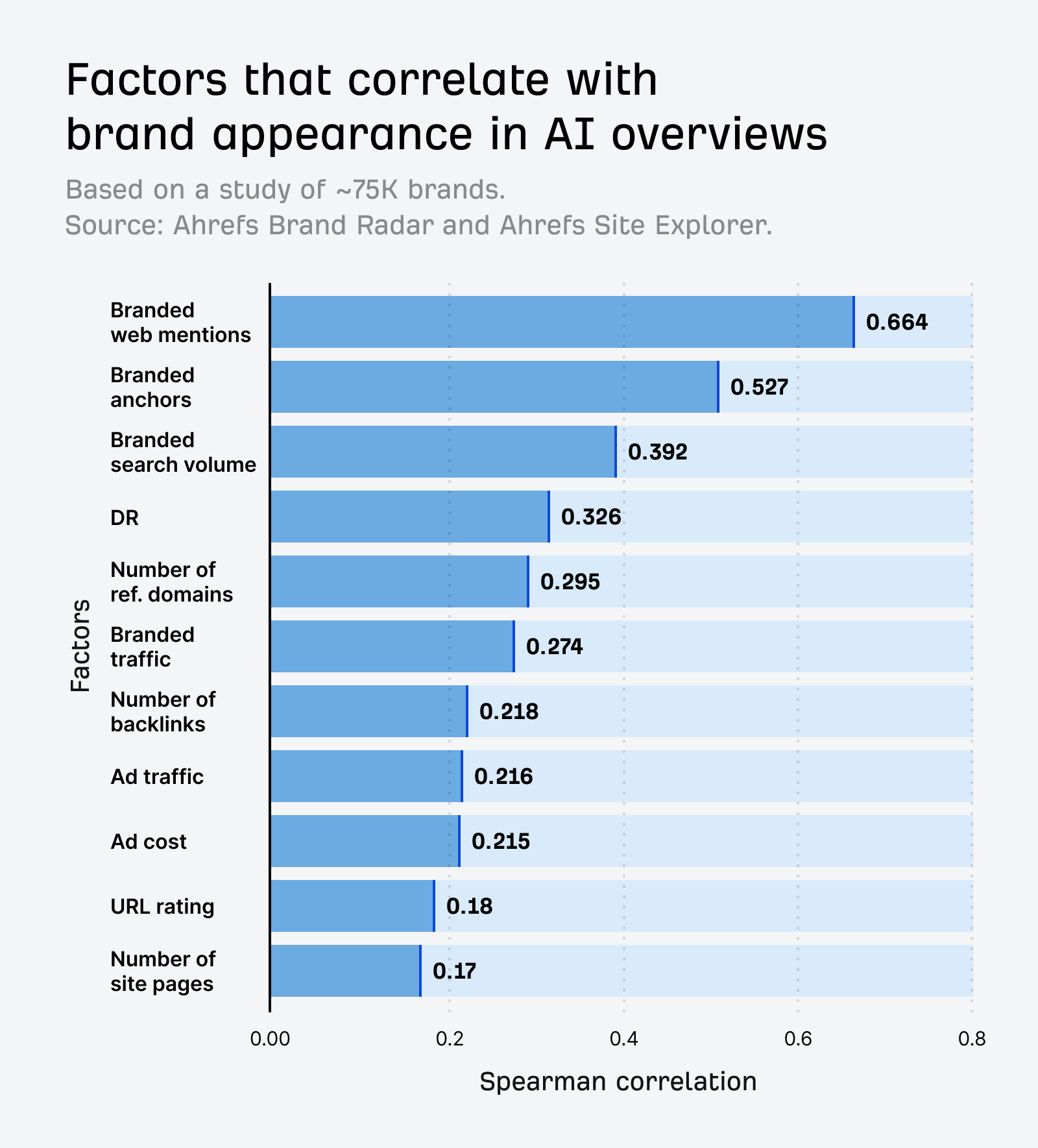
Final thoughts
These AI SEO statistics show a rapidly shifting landscape.
Clicks are falling, content is changing, and brands with authority dominate visibility. SEO success now depends on adapting strategies for AI search features, optimizing content creation, and strengthening brand signals to stay visible in AI-driven search
Further reading
Similar Posts

How Much Does an SSL Certificate Cost in 2025? Your Comprehensive Guide to Prices
So, what’s the price of an SSL certificate in 2025? Our handy guide to prices and what you get for your money has you covered. Table of Contents So, you’ve finally decided to get an SSL certificate to make sure your website is secure and gives your visitors confidence. But how much does an SSL…
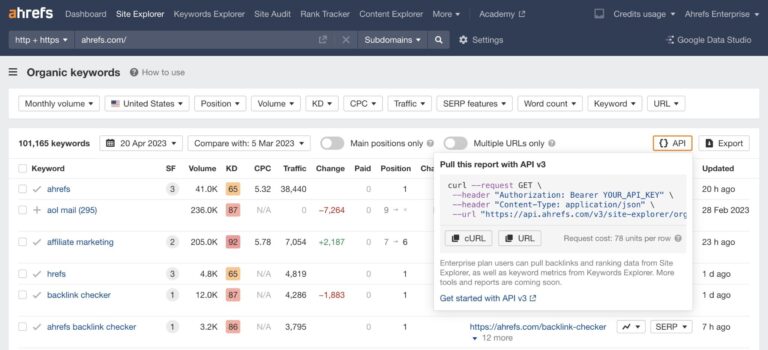
13 Technical Marketing Skills You Can Learn (Even If You’re Not Technical)
Many marketers hit limits not because they lack ideas, but because they can’t execute or scale them. Not everyone has the luxury of developers, designers, or analysts who can help turn big ideas into reality. Even if you do, you still need to compete for time and help with the rest of your organisation. But times…
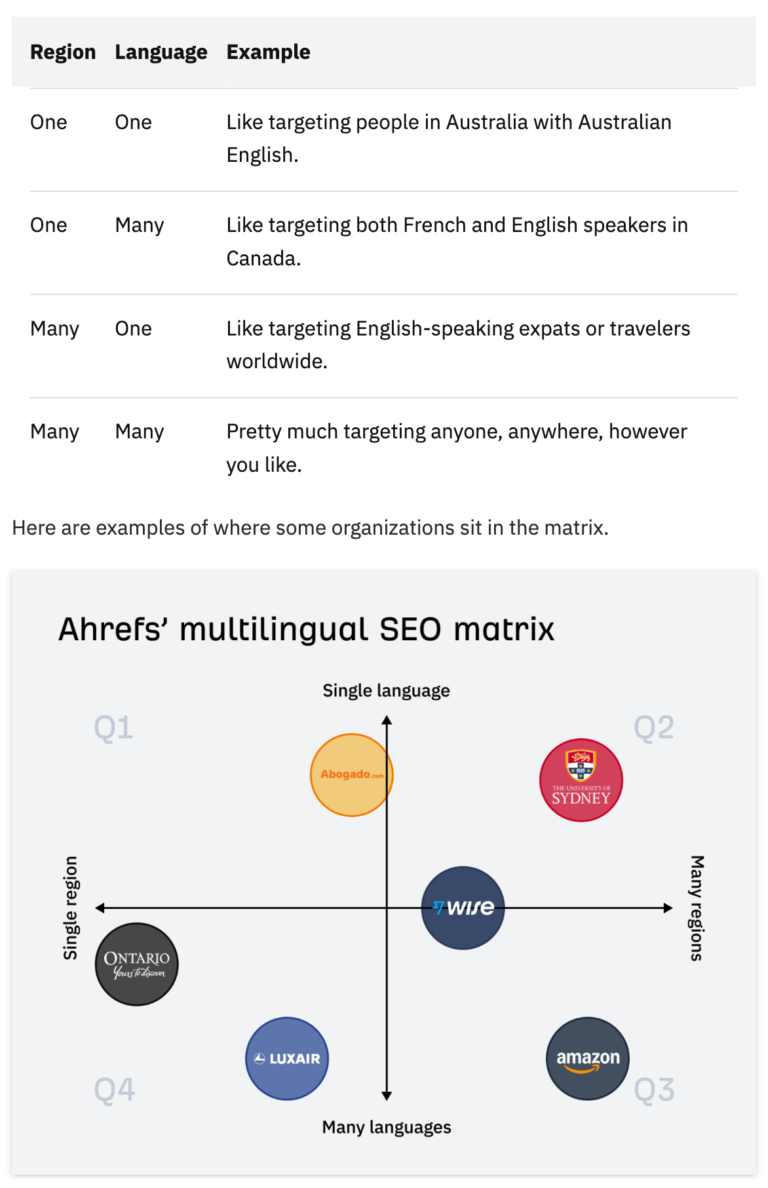
LLMs Don’t Reward Originality, They Flatten It
Originality is idealized, especially in tech and marketing. We’re told to “think different,” to coin new terms, to pioneer ideas no one’s heard before and share our thought leadership. But in the age of AI-driven search, originality is not the boon we think it is. It might even be a liability… or, at best, a…
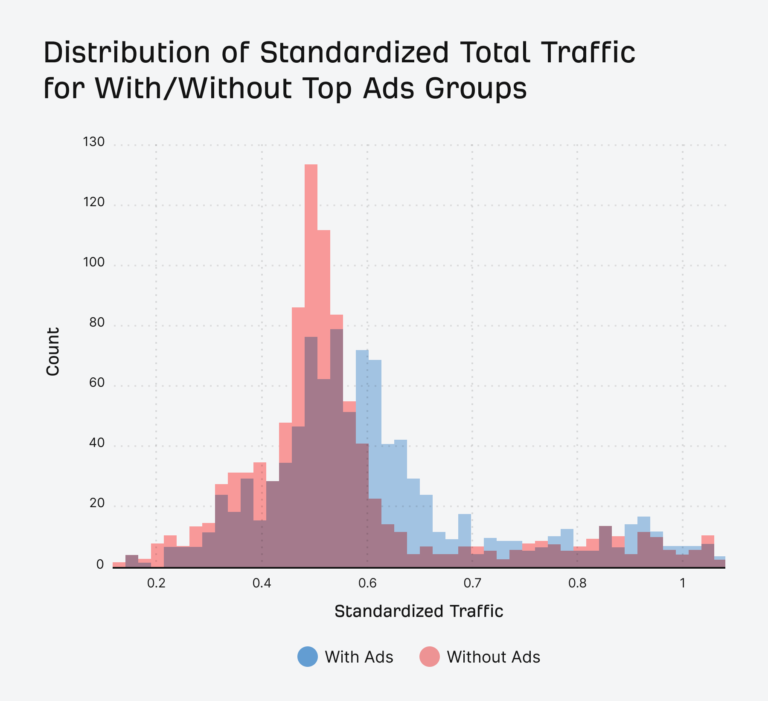
Bidding on Branded Terms Increases Clicks by 18.3%
Get the week’s best marketing content We ran this study to find out if running paid ads cannibalize organic traffic or not. Most SEOs are against bidding on branded terms because it is believed that buying paid ads cannibalizes organic traffic and it can also impact attribution for conversions and revenue. Paid advertisers believe there is…
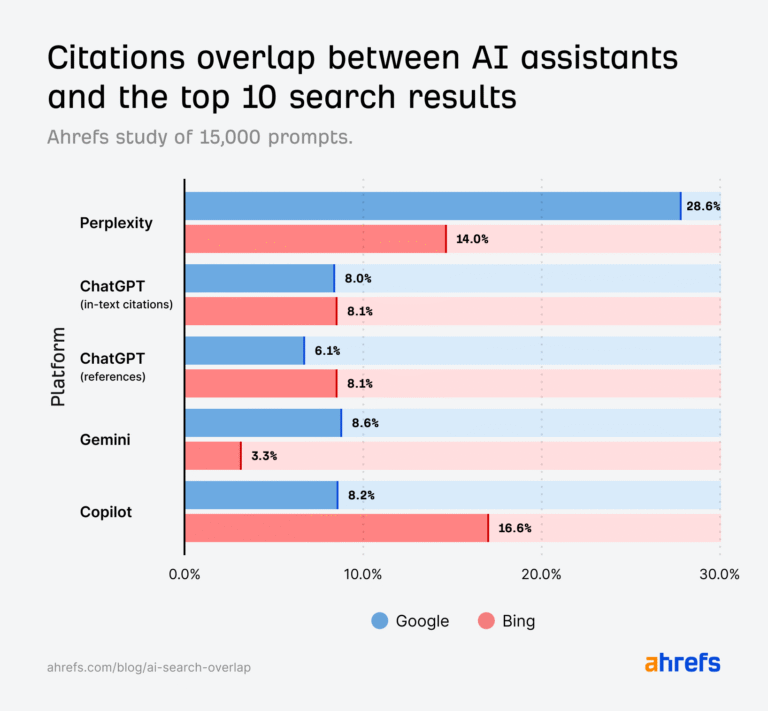
Only 12% of AI Cited URLs Rank in Google’s Top 10 for the Original Prompt
In a dataset of 15,000 prompts, we found that—on average—only 12% of links cited by ChatGPT, Gemini, and Copilot appear in Google’s top 10 results for the same prompt. Perplexity is the outlier: nearly 1 in 3 of its citations point to pages that rank in the top 10 for the target query. We analyzed…
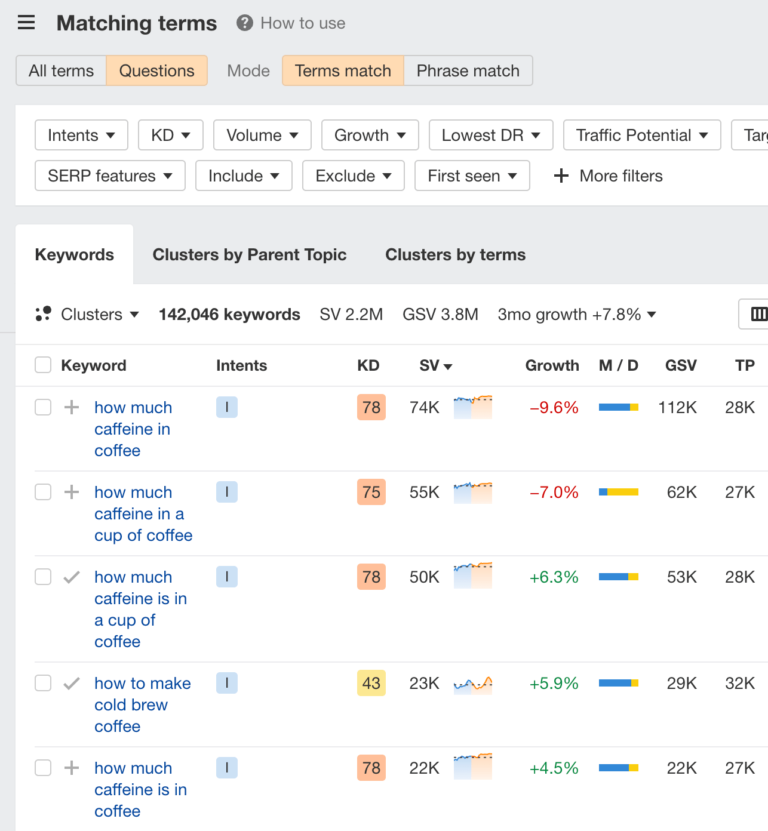
100 Most Asked Questions on Google in 2025
These are the 100 most asked questions on Google, along with their monthly search volumes. Keywords Explorer Enter a relevant keyword Go to the Matching terms report Toggle the Questions tab For example, if you search for “coffee”, you can see 142,000 questions which you could potentially create content for. Want to do keyword research for your site?…

Google’s AI Overviews
AI Overviews are one of the most disruptive features Google has launched, altering click-through rates and visibility across industries.
The following numbers show their reach, growth, and the factors that influence which brands get cited.
- AI Overviews had over 1.5 billion users a month in Q1 2025. That would be 18.3% of all the people on the planet, or 26.6% of all internet users. (Source)
- AI Overviews reduce clicks to websites by 34.5%. (Source)
- 26% of brands have zero mentions in AI Overviews. (Source)
- The top 50 brands appearing in AI Overviews account for 28.9% of all citations. (Source)
- 8.64% of AI Overviews appear outside of position #1 and as low as position #6. (Source)
- Being mentioned on highly linked pages has a strong correlation with visibility in AI Overviews. (Source)
- AI Overviews lean more heavily on UGC sites, displaying Reddit 3.4%, Quora 2.2%, and YouTube 2% more than expected. (Source)
- 16% of US searches on Google feature AI Overviews. (Source)
- AI Overviews have grown by 116%, doubling since Google’s March Core Update. (Source)
- 76% of AI Overview citations are pulled from the pages, ranking in Google’s top 10 organic results. (Source)
- AI Overviews show more than normal for informational queries, longer search queries, and queries with higher search volumes. (Source)
- AI Overviews show up less than normal for branded queries, local queries, and shorter search queries. (Source)
- 71.67% of AI Overview search results aren’t monetized, displaying no CPC data. (Source)
- Rankings matter for visibility in AI Overviews, but there’s only a moderate correlation. (Source)
- Pages with a higher ranking in organic results tend to be cited higher in AI Overviews when included as a citation. (Source)
- Brands in the top 25% for web mentions earn over 10× more AI Overview mentions than the next quartile. (Source)
- Reddit now appears in 5.5% of AI Overviews. (Source)

ChatGPT
As the most widely used AI assistant, ChatGPT has become the single biggest driver of AI referral traffic.
These stats highlight how it sources information, what types of content it favors, and its outsized role in shaping AI search behavior.
- ChatGPT sends about 5% more traffic than Reddit. (Source)
- Google does not power most ChatGPT results. Only 6.82% of ChatGPT results overlap with Google’s top 10; 83% of its answers cite URLs not in Google at all. (Source)
- ChatGPT has driven AI traffic growth to websites almost single-handedly, growing 85% since January. (Source)
- ChatGPT is the top AI referrer, accounting for over 80% of AI traffic to websites. That’s up 30% since our previous study. (Source)
- Being mentioned on highly linked pages has a weak correlation with visibility in ChatGPT responses. (Source)
- ChatGPT is the most likely platform to cite newer content. It orders in-text references from newest to oldest. (Source)
- News outlets like Reuters, Apple News, and AS.com feature prominently in ChatGPT (4 – 2.6%) but are secondary or absent in the others. ChatGPT likes news sites. (Source)

AI citation insights
Not all websites are treated equally in AI results. This section covers which platforms and content types get favored, and how citation patterns vary between ChatGPT, Perplexity, and Google’s AI Overviews.
- Wikipedia dominates all three AI assistants, but ChatGPT (16.3%) cites it most, then Perplexity (12.5%), then AI Overviews (8.4%). (Source)
- YouTube is a clear favorite in Perplexity (16.1%) and AI Overviews (9.5%), but is missing in the top in ChatGPT. (Source)
- Reddit and Quora rank high only in AI Overviews (7.4% & 3.6%). They don’t crack the top-10 in ChatGPT or Perplexity. It seems Google favors user-generated content sites. (Source)
- Health/medical sites (Mayo Clinic, Cleveland Clinic) register in AI Overviews but are not in the top 10 for ChatGPT or Perplexity. (Source)
- Reddit is 3.4% more likely to be mentioned in AI Overviews and Google results than expected. (Source)
AI bot behavior
AI bots are quickly catching up to traditional search crawlers. These stats show how fast they’re growing, which bots are most blocked, and what that means for publishers managing traffic and server load.
- The number of AI bots has doubled since August 2023, with 21 major AI bots now active on the web. (Source)
- GPTBot (OpenAI) is the most blocked AI bot, with 5.89% of all websites blocking them. (Source)
- ClaudeBot (Anthropic) saw the highest growth in block rates, increasing by 32.67% over the past year. (Source)
- AI bots are increasing their crawling activities, reaching 2nd place behind search engine bots and contributing to 25% of requests. (Source)

Source)
Only 26% of new web content is entirely human-created, and only half of that (13.5%) ranks in top positions on Google. (Source)
Best-of content, product pages, and guides drive the most AI traffic. (Source)
AI-generated content does not hurt your Google rankings. 86.5% of content in the top 20 is at least partially AI-generated. (Source)
However, purely AI content rarely reaches position #1 in organic Google results. (Source)
Human content was 4% more likely to be negatively impacted by a Google update than AI content. (Source)
91.4% of content cited in AI Overviews is at least partially AI-generated. (Source)
There is no correlation between the amount of AI content in an article and search ranking position. (Source)
There is no correlation between AI content percentage and the order of citations in AI Overviews. (Source)

AI content adoption
Marketers are rapidly adopting AI to scale production.
This section outlines how widely AI is used, what tasks it supports, and the cost benefits driving businesses to increase investment in AI tools and content creation.
- 87% of marketers use AI to help create content. (Source)
- AI content is 4.7x cheaper than human-written content. (Source)
- The average cost per AI-generated blog post is $131, compared to $611 for human-written posts. (Source)
- Companies spend an average of $188 per month on AI tools for content creation and marketing. (Source)
- 51% of companies plan to increase their spend on AI-generated content. (Source)
- Websites using AI grow 5% faster than those that don’t. (Source)
- Marketers using AI publish 42% more content: the median monthly publishing frequency using AI was 17 articles, compared to 12 for those not using AI. (Source)
- 97% of companies have a review process for AI content and do not publish pure AI content. (Source)
- Blog posts are the most common type of AI-generated content (87%). Brainstorming (76%), outlining (73%), and content updates (67%) are the top AI-assisted SEO tasks. (Source)
- 84% of companies do not disclose the use of AI in their content. (Source)
- ChatGPT is the most common AI model for content creation, used by 44% of respondents, followed by Gemini (15%) and Claude (10%). In total, 94 distinct AI tools were referenced. (Source)

AI may still send a small share of traffic, but the quality of those visits can be disproportionately high.
These stats break down AI referral volume, user behavior, and why AI visitors often convert at higher rates than search users.
- AI makes up 0.1% of web referral traffic. (Source)
- Average web traffic from search has dropped 21% over the last year. (Source)
- AI traffic has increased 9.7x in the past year. (Source)
- Traffic from AI assistants generated 12% of signups to Ahrefs while accounting for only 0.5% of traffic. (Source)
- For Ahrefs, AI search visitors convert 23x better than traditional organic search visitors. (Source)
- Users from AI search click links 75% less than they do in traditional search. (Source)
- About 0.25% of a site’s total traffic comes from AI. (Source)
- ChatGPT sends out marginally more traffic than Reddit and LinkedIn. (Source)
- Perplexity has overtaken Gemini as a traffic referral source. (Source)
- Sites receiving under 10K visits can expect 0.3% of their traffic to come from LLMs, vs. 0.1% for those exceeding 1 million visits. (Source)
- Visitors from common AI platforms like ChatGPT and Perplexity visit 4 pages on average. That’s 1.2 fewer pages compared to search visitors, and 1.5 fewer pages than overall visitors (Source)
- AI visitors spend slightly longer on site (8 seconds more) than other visitors. Their sessions are longer in duration but shallower in depth as they’re 5.4% more likely to bounce. (Source)
- Websites with more traffic from organic search also get mentioned more in AI responses. (Source)
- 63% of websites receive AI traffic. (Source)

AI search rewards authority and recognition, often more than links or ads.
Here’s how branded web mentions, anchors, and search volume influence AI Overview visibility and why some brands dominate while others remain invisible.
- Brands in the top 25% for web mentions get 10x more AI visibility than others. (Source)
- The top 50 brands (ranked by online authority) receive 28.90% of all mentions in AI Overviews. (Source)
- Google seems more biased toward featuring big brands than ChatGPT and Perplexity. (Source)
- 45.7% of Google searches are branded. (Source)
- Strong online branding correlates positively with visibility in AI Overviews. Branded web mentions had the strongest correlation, followed by branded anchors and search volume. (Source)
- Backlinks have weaker correlations with visibility in AI Overviews compared to brand factors. (Source)
- Paid factors like branded ad traffic and branded ad cost show weak positive correlations with AI mentions. (Source)
- 26% of brands have zero mentions in AI Overviews. (Source)

Final thoughts
These AI SEO statistics show a rapidly shifting landscape.
Clicks are falling, content is changing, and brands with authority dominate visibility. SEO success now depends on adapting strategies for AI search features, optimizing content creation, and strengthening brand signals to stay visible in AI-driven search
Further reading

AI content adoption
Marketers are rapidly adopting AI to scale production.
This section outlines how widely AI is used, what tasks it supports, and the cost benefits driving businesses to increase investment in AI tools and content creation.
- 87% of marketers use AI to help create content. (Source)
- AI content is 4.7x cheaper than human-written content. (Source)
- The average cost per AI-generated blog post is $131, compared to $611 for human-written posts. (Source)
- Companies spend an average of $188 per month on AI tools for content creation and marketing. (Source)
- 51% of companies plan to increase their spend on AI-generated content. (Source)
- Websites using AI grow 5% faster than those that don’t. (Source)
- Marketers using AI publish 42% more content: the median monthly publishing frequency using AI was 17 articles, compared to 12 for those not using AI. (Source)
- 97% of companies have a review process for AI content and do not publish pure AI content. (Source)
- Blog posts are the most common type of AI-generated content (87%). Brainstorming (76%), outlining (73%), and content updates (67%) are the top AI-assisted SEO tasks. (Source)
- 84% of companies do not disclose the use of AI in their content. (Source)
- ChatGPT is the most common AI model for content creation, used by 44% of respondents, followed by Gemini (15%) and Claude (10%). In total, 94 distinct AI tools were referenced. (Source)

AI may still send a small share of traffic, but the quality of those visits can be disproportionately high.
These stats break down AI referral volume, user behavior, and why AI visitors often convert at higher rates than search users.
- AI makes up 0.1% of web referral traffic. (Source)
- Average web traffic from search has dropped 21% over the last year. (Source)
- AI traffic has increased 9.7x in the past year. (Source)
- Traffic from AI assistants generated 12% of signups to Ahrefs while accounting for only 0.5% of traffic. (Source)
- For Ahrefs, AI search visitors convert 23x better than traditional organic search visitors. (Source)
- Users from AI search click links 75% less than they do in traditional search. (Source)
- About 0.25% of a site’s total traffic comes from AI. (Source)
- ChatGPT sends out marginally more traffic than Reddit and LinkedIn. (Source)
- Perplexity has overtaken Gemini as a traffic referral source. (Source)
- Sites receiving under 10K visits can expect 0.3% of their traffic to come from LLMs, vs. 0.1% for those exceeding 1 million visits. (Source)
- Visitors from common AI platforms like ChatGPT and Perplexity visit 4 pages on average. That’s 1.2 fewer pages compared to search visitors, and 1.5 fewer pages than overall visitors (Source)
- AI visitors spend slightly longer on site (8 seconds more) than other visitors. Their sessions are longer in duration but shallower in depth as they’re 5.4% more likely to bounce. (Source)
- Websites with more traffic from organic search also get mentioned more in AI responses. (Source)
- 63% of websites receive AI traffic. (Source)

AI search rewards authority and recognition, often more than links or ads.
Here’s how branded web mentions, anchors, and search volume influence AI Overview visibility and why some brands dominate while others remain invisible.
- Brands in the top 25% for web mentions get 10x more AI visibility than others. (Source)
- The top 50 brands (ranked by online authority) receive 28.90% of all mentions in AI Overviews. (Source)
- Google seems more biased toward featuring big brands than ChatGPT and Perplexity. (Source)
- 45.7% of Google searches are branded. (Source)
- Strong online branding correlates positively with visibility in AI Overviews. Branded web mentions had the strongest correlation, followed by branded anchors and search volume. (Source)
- Backlinks have weaker correlations with visibility in AI Overviews compared to brand factors. (Source)
- Paid factors like branded ad traffic and branded ad cost show weak positive correlations with AI mentions. (Source)
- 26% of brands have zero mentions in AI Overviews. (Source)

Final thoughts
These AI SEO statistics show a rapidly shifting landscape.
Clicks are falling, content is changing, and brands with authority dominate visibility. SEO success now depends on adapting strategies for AI search features, optimizing content creation, and strengthening brand signals to stay visible in AI-driven search
Further reading
Similar Posts

How Much Does an SSL Certificate Cost in 2025? Your Comprehensive Guide to Prices
So, what’s the price of an SSL certificate in 2025? Our handy guide to prices and what you get for your money has you covered. Table of Contents So, you’ve finally decided to get an SSL certificate to make sure your website is secure and gives your visitors confidence. But how much does an SSL…

13 Technical Marketing Skills You Can Learn (Even If You’re Not Technical)
Many marketers hit limits not because they lack ideas, but because they can’t execute or scale them. Not everyone has the luxury of developers, designers, or analysts who can help turn big ideas into reality. Even if you do, you still need to compete for time and help with the rest of your organisation. But times…

LLMs Don’t Reward Originality, They Flatten It
Originality is idealized, especially in tech and marketing. We’re told to “think different,” to coin new terms, to pioneer ideas no one’s heard before and share our thought leadership. But in the age of AI-driven search, originality is not the boon we think it is. It might even be a liability… or, at best, a…

Bidding on Branded Terms Increases Clicks by 18.3%
Get the week’s best marketing content We ran this study to find out if running paid ads cannibalize organic traffic or not. Most SEOs are against bidding on branded terms because it is believed that buying paid ads cannibalizes organic traffic and it can also impact attribution for conversions and revenue. Paid advertisers believe there is…

Only 12% of AI Cited URLs Rank in Google’s Top 10 for the Original Prompt
In a dataset of 15,000 prompts, we found that—on average—only 12% of links cited by ChatGPT, Gemini, and Copilot appear in Google’s top 10 results for the same prompt. Perplexity is the outlier: nearly 1 in 3 of its citations point to pages that rank in the top 10 for the target query. We analyzed…

100 Most Asked Questions on Google in 2025
These are the 100 most asked questions on Google, along with their monthly search volumes. Keywords Explorer Enter a relevant keyword Go to the Matching terms report Toggle the Questions tab For example, if you search for “coffee”, you can see 142,000 questions which you could potentially create content for. Want to do keyword research for your site?…

